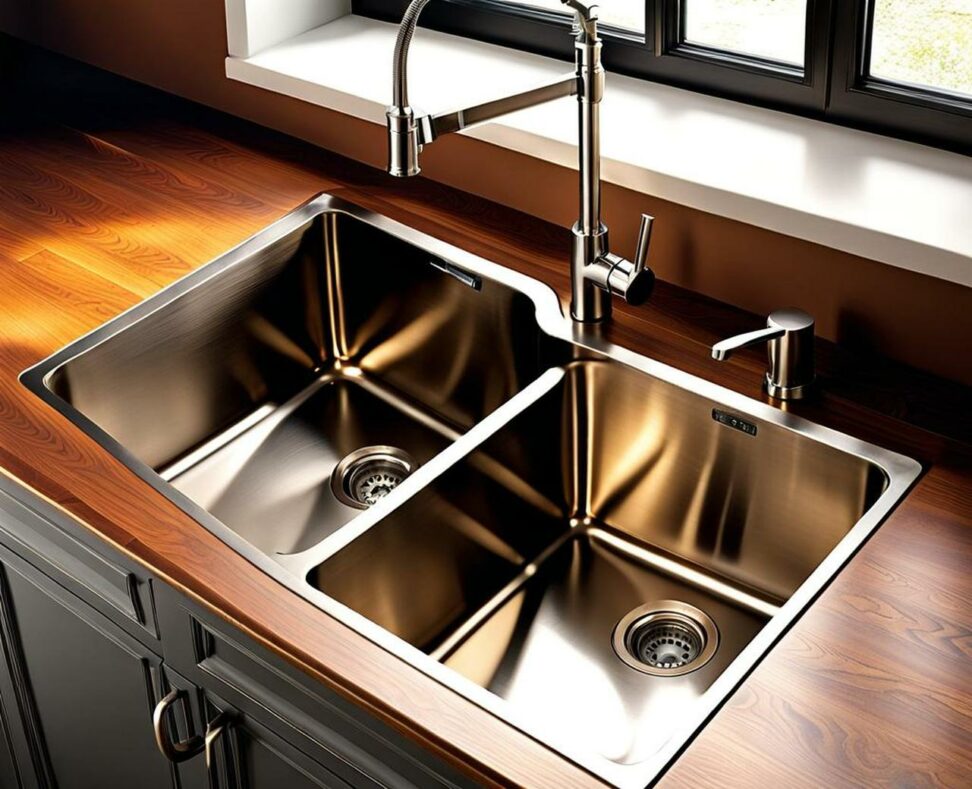The Expert Guide to Picking Durable and Stylish Kitchen Sink Materials
When renovating or building a new kitchen, one of the most important decisions is choosing the right sink material. With options like stainless steel, porcelain, granite composite, and more, it can be tricky to identify which material will offer the ideal blend of aesthetics, durability, and ease of maintenance for your needs and budget.
We’ll look at key factors like durability, stain and scratch resistance, noise levels, heat tolerance, cost, and design flexibility. Armed with this information, you can zero in on the perfect material for your kitchen.
Stainless Steel Sinks
With their affordable price, rugged durability, and wide range of styles, stainless steel sinks remain the most popular kitchen sink option.

Pros of Stainless Steel Sinks
- Most affordable sink material
- Extremely durable - resists dents, scratches
- Easy to clean and sanitize
- Available in many styles like single bowl, double bowl
- Stainless finish matches most kitchen designs
Cons of Stainless Steel Sinks
- Can be noisy when washing dishes
- Shows light scratches over time
- Cheaper gauges prone to dents
Granite Composite Sinks
For a stylish, ultra-durable sink, granite composite is a top contender. This material blends granite stone particles with acrylic resin to create a strong, scratch-resistant surface.
Pros of Granite Composite Sinks
- Stylish options to match different kitchen designs
- Extremely durable - resists scratches, stains, heat
- Easy to clean
- Dampens noise well
Cons of Granite Composite Sinks
- Significantly more expensive than stainless steel
- Needs periodic sealing to protect surface
Porcelain Sinks
With their classic look, porcelain sinks complement a variety of kitchen aesthetics from traditional to modern.
Pros of Porcelain Sinks
- Classic look matches many kitchen styles
- Very durable against scratches and stains
- Available as undermount or drop-in
- Range of color options like white, biscuit, black
Cons of Porcelain Sinks
- Can chip or crack if subjected to heavy impact
- Noisy when pots, dishes clash with surface
Fireclay Sinks
Fireclay is a traditional farmhouse-style sink material known for its durability and heat retention.
Pros of Fireclay Sinks
- Traditional style perfect for farmhouse kitchens
- Extremely durable, scratch-resistant surface
- Can be undermount or apron-front
- Keeps water warmer longer
Cons of Fireclay Sinks
- Much heavier than other sink materials
- Higher price point
- Slower installation process
Natural Stone Sinks
For a high-end, luxury look, sinks hand-carved from natural stone make a gorgeous statement.
Pros of Natural Stone Sinks
- Gorgeous, luxury look
- Unique veining patterns in each sink
- Retains heat well
Cons of Natural Stone Sinks
- Very expensive
- Porous, prone to staining/etching
- Needs frequent sealing
Copper Sinks
Copper is beloved for its warm, artisanal aesthetic and naturally antimicrobial properties.
Pros of Copper Sinks
- Gorgeous vintage aesthetic
- Antimicrobial properties
- Develops a lovely patina over time
Cons of Copper Sinks
- Very expensive
- Prone to scratches/dents
- Needs frequent polishing
Key Factors to Consider
When evaluating kitchen sink materials, keep the following factors in mind:
- Frequency of use - how often will the sink be used?
- Budget - pricing varies widely between materials
- Noise concerns - some materials amplify sounds
- Aesthetic preferences - traditional, modern, etc.
While stainless steel is a sound default option, materials like granite composite and fireclay offer enhanced durability. For style, copper and natural stone provide eye-catching good looks. Be sure to factor in your budget, kitchen design, and how heavily the sink will be used.
Taking time to examine samples in person is the best way to make sure your selected material aligns with your goals for functionality and aesthetics.